UK Musicians Still Making Beautiful Music Behind the Mask
LEXINGTON, Ky. (Sept. 23, 2020) — Although audiences aren't gathering at the Singletary Center for the Arts and other similar arts and entertainment venues due to the COVID-19 pandemic, music can still be heard around campus as University of Kentucky’s instrumentalists and vocalists adapt to the “new normal.”
To make sure these Wildcats can continue to make music, several precautions — including specially designed masks — are being used in classes, rehearsals and performances from the Fine Arts Building to Kroger Field.
While wearing a mask is not much different than it is for the average human being if you are a percussionist or someone who plays a stringed instrument, it is vastly different for those who sing or play brass or woodwind. To perform, these musicians literally use their breath to make sound and manipulate that sound through pressure, speed and sustainment producing aerosols — actions that put unmasked musicians at more risk of catching or transmitting disease via respiratory droplets.
To keep students, faculty and staff as safe as possible, ensemble directors in the UK School of Music spent the summer researching best practices for making music in various settings. While some music classes, lessons and concerts are utilizing technology to allow remote learning and performing, others are being presented in person with several modifications.
For classes and rehearsals, the School of Music took multiple precautions including moving students into larger spaces, implementing strict cleaning procedures, prohibiting the sharing of instruments, holding member numbers down in ensembles, spacing out musicians at least 6 feet apart, adding plexiglass screens, adding covers over bells of instruments, shortening rehearsal times to allow for more breaks to let spaces “air out,” and, of course, requiring masks.
For brass and woodwind musicians, UK Director of Bands Cody Birdwell, UK Director of Orchestras John Nardolillo and UK Jazz Studies Director Miles Osland worked with a company out of Texas to acquire specially designed masks for instrumentalists and distribute them to the School of Music’s Wildcat Marching Band, jazz ensembles, orchestras and wind ensembles.
Each mask has two layers — the first has a slit, where the mouthpiece goes into the mask, and the second layer has two cloth flaps, which are opened when the instrument is being played to allow the mouthpiece to go into the mouth. When the musician is done playing, the flaps are closed, creating a barrier between the mouth and the slit and allowing the mask to be protective as normal.
Adjustments to these masks are different for each instrument. For example, musicians playing the piccolo and flute actually slide the instrument completely through the mask itself, and for those playing a reed instrument they have to be careful to not damage their reed on the mask.
And while it is taking some time to get used to, most UK instrumentalists welcome the changes.
“Practicing and performing with the special instrument masks on was a huge adjustment at first,” said biology senior Jason Flynn, a trombone player from Taylor Mill, Kentucky, who plays with the Wildcat Marching Band and UK Pep Band. “During band camp this year, it seemed that all members of the marching band, both music and non-music majors alike, had to adjust to playing with masks on. Occasionally it can be tough when playing for long periods of time without stepping aside to drink some water. At this point in the semester, I feel like most musicians on campus have adjusted to this ‘new normal’ of wearing masks while playing.”
Music education junior Katie De Witt, a clarinet player from Palatine, Illinois, who is a member of UK Symphony Band, Wildcat Marching Band and UK Pep Band, agreed. “It's definitely been an adjustment from normal playing. It was really weird and difficult the first few days, but after lots of practicing and rehearsals, playing with the masks has gotten a lot easier and is just a part of our playing habits.
“I'm really happy to be back on campus and making music with my friends again. Music can bring us together in challenging times, and it's encouraging to see the bands at UK make adjustments so that we can keep performing and making music together in a safe manner,” De Witt added.
UK School of Music’s ensemble directors are also happy with the students’ adoption of these practices and the quality of their performance.
“The masks are cumbersome to play with, but once you get used to it, it’s not too bad,” said Osland, who noted the changes have also required some extra time to count off a tune. “In the UK Jazz Ensemble, I’ve been quite pleased.”
And what about those musicians whose own vocal cords are their instrument? If you recently watched Jonathan Groff sing as King George III in the movie production of the musical “Hamilton,” you are well aware that vocalists can expel a significant amount of aerosol while performing.
For these musicians, UK choral directors with the assistance of OperaLex and UK Opera Theatre Director Everett McCorvey acquired a more tented mask for their students, faculty and staff.
Singers’ masks are a bit larger and more structured than regular masks. They wrap around more of the face while simultaneously sticking farther out from the mouth and nose creating almost a beak or tent effect. While normal masks are basically a square of fabric, singers' masks have more sections put together, often with a wire or thick fabric frame to allow for additional space between the mask and the nose and mouth, while still creating a seal to the face.
The extra space built into a “singer’s mask” is a necessity for vocalists explained choral conducting doctoral candidate Meg Gurtcheff, who works with UK’s Chorale and Women’s Choir. “There are two primary benefits to using a singer's mask: 1. because there is more structure to these masks, you can take a deep, quick breath without the fabric moving into your mouth, and 2. it allows for better consonants because there is more space between the mask and your lips, teeth and tongue. These modifications are necessary for clear articulation of text as well as deep, steady breath flow.”
And similar to UK’s instrumentalists, choral music education senior Nick Rowan, a member of UK’s Chorale, Men's Choir and the acoUstiKats, said UK’s vocalists are willing to adapt and get past the learning curve of knowing how to correctly sing with a mask on, including finding the way to get quality inhalation.
“Honestly, it is not the most ideal of situations, but it is worth it just to be able to sing in a group comfortably again,” Rowan, a Louisville native, said.
Gurtcheff, a native of Athens, Georgia, added, “While not as comfortable as singing without a mask, using a singer's mask is far more comfortable and satisfying than singing in a regular mask. You can hear yourself much better than with a regular mask, you can take full, deep breaths, you can achieve better diction, and because the singer's mask is larger than normal ones, you don't have to adjust it every time you sing a tall vowel (when singers open their mouths wide for a tall vowel, say ‘ah,’ a regular mask will cease to cover both nose and mouth and must be readjusted).”
Now, just over a month into the fall semester, the hard work to successfully implement new protocols is making these musicians feel comfortable to do what they love to do — perform.
“I feel that the precautions being taken are truly the best way to have allowed UK Opera Theatre and UK Choirs students to remain in session this fall,” Rowan said. “From the moment we knew we would be on campus, the professors read articles, studied and put a plan in place to keep us safe, and I think they have done an excellent job in creating and executing that plan.”
Flynn concurred. “In a perfect world, we would not need to wear masks while practicing and performing in order to keep each other safe. The reality of the situation is that wearing masks is a necessary safety precaution to make sure we can keep on performing. Myself, along with many of my peers in the band, are happy to perform with masks on knowing that this is the best way to keep on sharing music with the community while keeping everyone safe.”
The School of Music at the UK College of Fine Arts has garnered a national reputation for high-caliber education in opera, choral and instrumental music performance, as well as music education, music therapy, composition, and theory and music history.
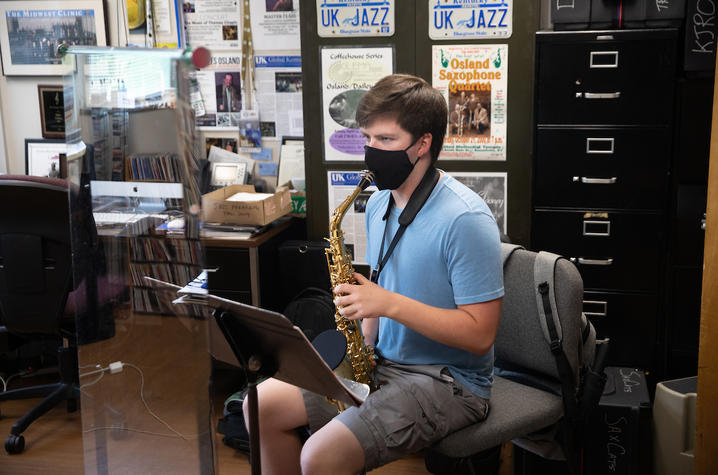
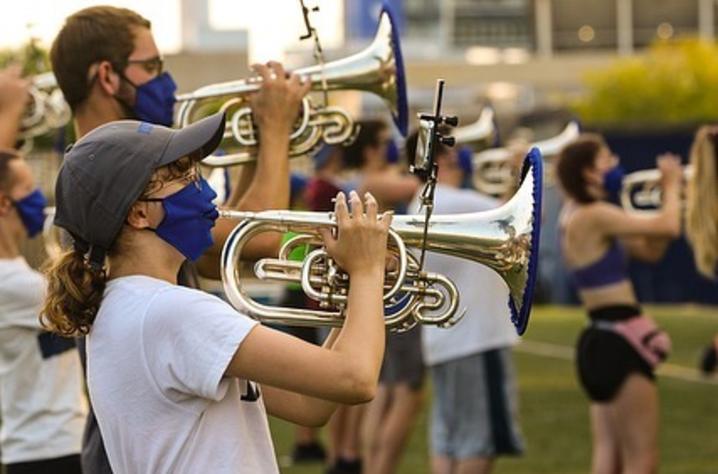
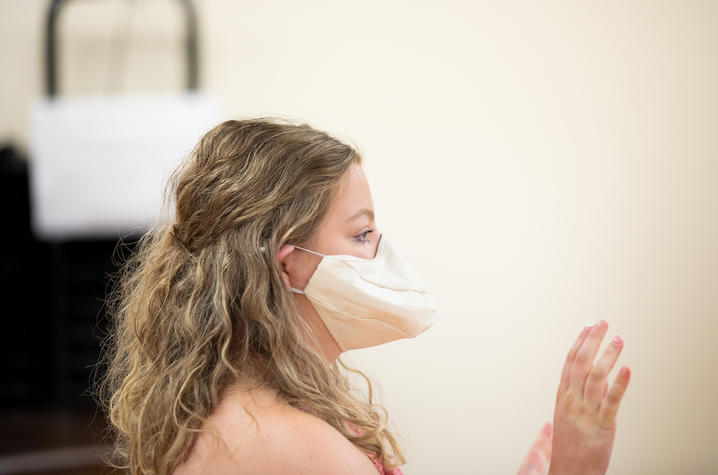
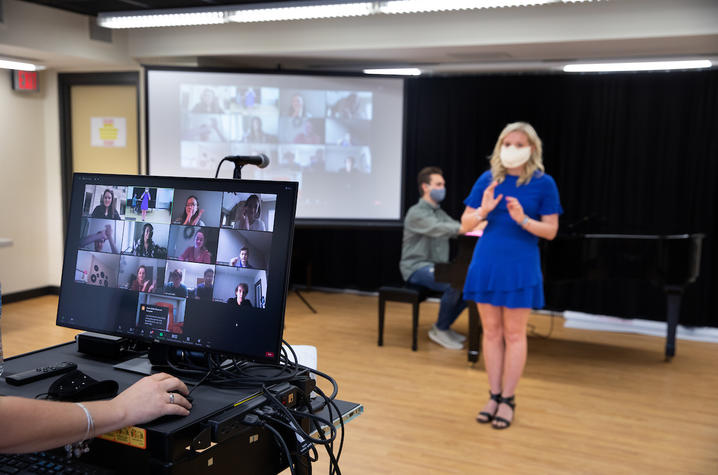

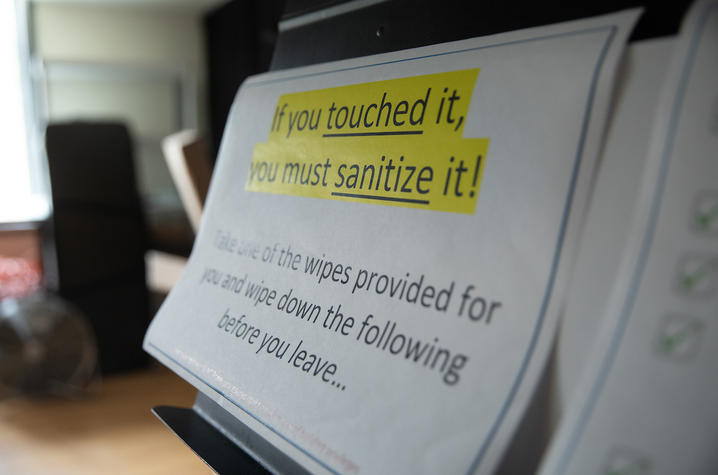
As the state’s flagship, land-grant institution, the University of Kentucky exists to advance the Commonwealth. We do that by preparing the next generation of leaders — placing students at the heart of everything we do — and transforming the lives of Kentuckians through education, research and creative work, service and health care. We pride ourselves on being a catalyst for breakthroughs and a force for healing, a place where ingenuity unfolds. It's all made possible by our people — visionaries, disruptors and pioneers — who make up 200 academic programs, a $476.5 million research and development enterprise and a world-class medical center, all on one campus.




